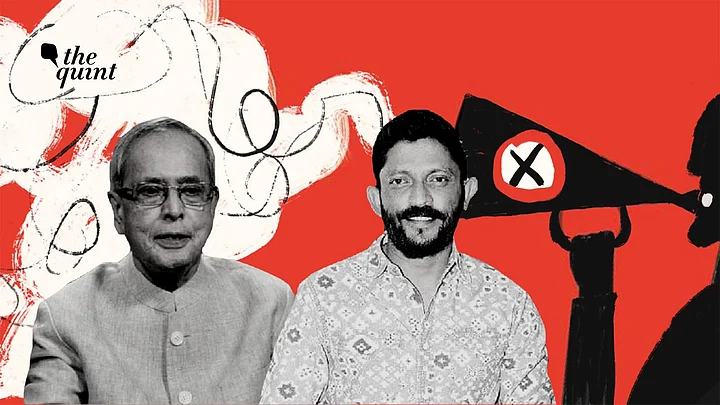“It’s a person. A doctor pronounces you’re dead. Not the news”Don Keefer in ‘The Newsroom’
Who would’ve thought that these words by Thomas Sadoski from an episode of ‘The Newsroom’ aired in 2012 will be more than just relevant for journalists in India in 2020? But here we are, reminding ourselves of the guidelines that must be followed while reporting deaths as Indian media’s reportage on that front continues to be – well...callous.
On 17 August, filmmaker Nishikant Kamat was prematurely declared dead by several news websites and TV channels. Kamat passed away a few hours later. Something similar happened last week in the case of former President Pranab Mukherjee, following which his family had to come out and issue a clarification regarding the politician’s health.
In the case of Kamat, mainstream news outlets including ABP News and News18 notified about his death when he was still critical and while many of them were quick to issue a correction, the damage had already been done as tributes started pouring in for the late director long before he actually died.
Similarly, senior journalist Rajdeep Sardesai fell for a piece of fake news and tweeted about the death of former President Pranab Mukherjee. Sardesai, too, issued an apology after Mukherjee’s family came out to clear the air around his health.
What Do the Guidelines Say?
Newsrooms across the globe are expected to follow several guidelines laid down by media watchdogs while reporting a death. For example, The Independent Press Standards Organisation (IPSO) in the UK states that while reporting death, journalists must make sure that the “reports about the death are accurate” and “they should not publish information that might cause any unnecessary upset to friends and family of the person who has died.”
In India, the Press Council of India (PCI) and News Broadcasting Standards Authority (NBSA) have laid down separate guidelines on the subject.
The NBSA guidelines on privacy say that “Broadcasters should exercise discretion and sensitivity when reporting on distressing situations, on grief and bereavement.” Similarly, The Press Council of India lays down norms for protecting the privacy of public figures, publishing corrections and a directive on the editor’s responsibility to publish news after due ‘verification.’
We spoke to Geeta Seshu, co-founder of the Free Speech Collective and a media critic who told us that while there are norms laid down by press bodies and even those which exist internally in news organisations, it is the implementation of those guidelines that is faulty.
“Given the increasing carelessness and insensitivity of the media, the press bodies need to include a specific point on the importance of verifying news of the death of public figures.”Geeta Seshu
‘Someone’s Death is Not an Occasion to Compete On’
“We’ve seen this trend for a while, especially in TV news, I remember before Jayalalithaa died, for about 2-3 days, TV channels in a hurry to break news, ran tickers saying she had died when she hadn’t, without waiting for an official confirmation,” said Manisha Pande, media critic and Executive Editor at Newslaundry.
“So, this isn’t new but announcing someone’s death is definitely not something to compete on even if you take into account the pressures of being on the ball with a developing story. Basic journalistic norms require you to wait for the doctor or the hospital to confirm.”Manisha Pande, Journalist and Media Critic
A similar trend was observed when several mainstream media outlets prematurely declared the death of former Prime Minister Atal Bihari Vajpayee.
However, one of the biggest media blunders when it comes to reporting premature deaths was committed by the All India Radio (AIR) when it declared the death of Jayaprakash Narayan in 1979. AIR, interrupting a regular program, told a stunned nation that Jayaprakash Narayan had died. However, the gaffe was exposed within an hour, when the then Janata Party President Chandra Shekhar announced that JP was very much alive.
Digital Media: A ‘Double-Edged’ Sword
Pande further added that insensitivity of Indian media while reporting on death or suicide has been on a glaring display recently even in the Sushant Singh Rajput case. “TV channels have gone way past the point of evaluating the ethical aspects of this debate. This is evident with the kind of reportage we’ve seen in the case of Sushant Singh Rajput. Many news channels turned his death into a spectacle from day one,” she said.
Speaking about the insensitivity towards families of people who are reported dead by the media, Seshu mentioned that news organisations must make efforts to cross-check and verify.
“There is a long list of guidelines on various issues but filters that used to exist in the past have obviously broken down. While there is no statutory code of conduct for journalists in India, there are clear guidelines within the organisations which should be followed.”Geeta Seshu, Co-founder, Free Speech Collective
Seshu added that the digital media is a “double-edged sword” and while there is a lot of speed, mistakes are amplified almost immediately and even called out at the same time. “In a 24-hour news cycle, it was possible to identify and correct and to verify whereas, in a news cycle which is almost immediate, one has to be extra careful,” she said.
While it’s true that speed is essential to the news, it should not come at the cost of accuracy. To begin with, journalists must start with something as simple as verifying information before putting it out in the public domain. And like Manisha Pande points out, “I don’t think viewers care or even register who broke the news on something like this. The race to be the ‘first’ is just an exercise in ego massage for news anchors and channels.”
